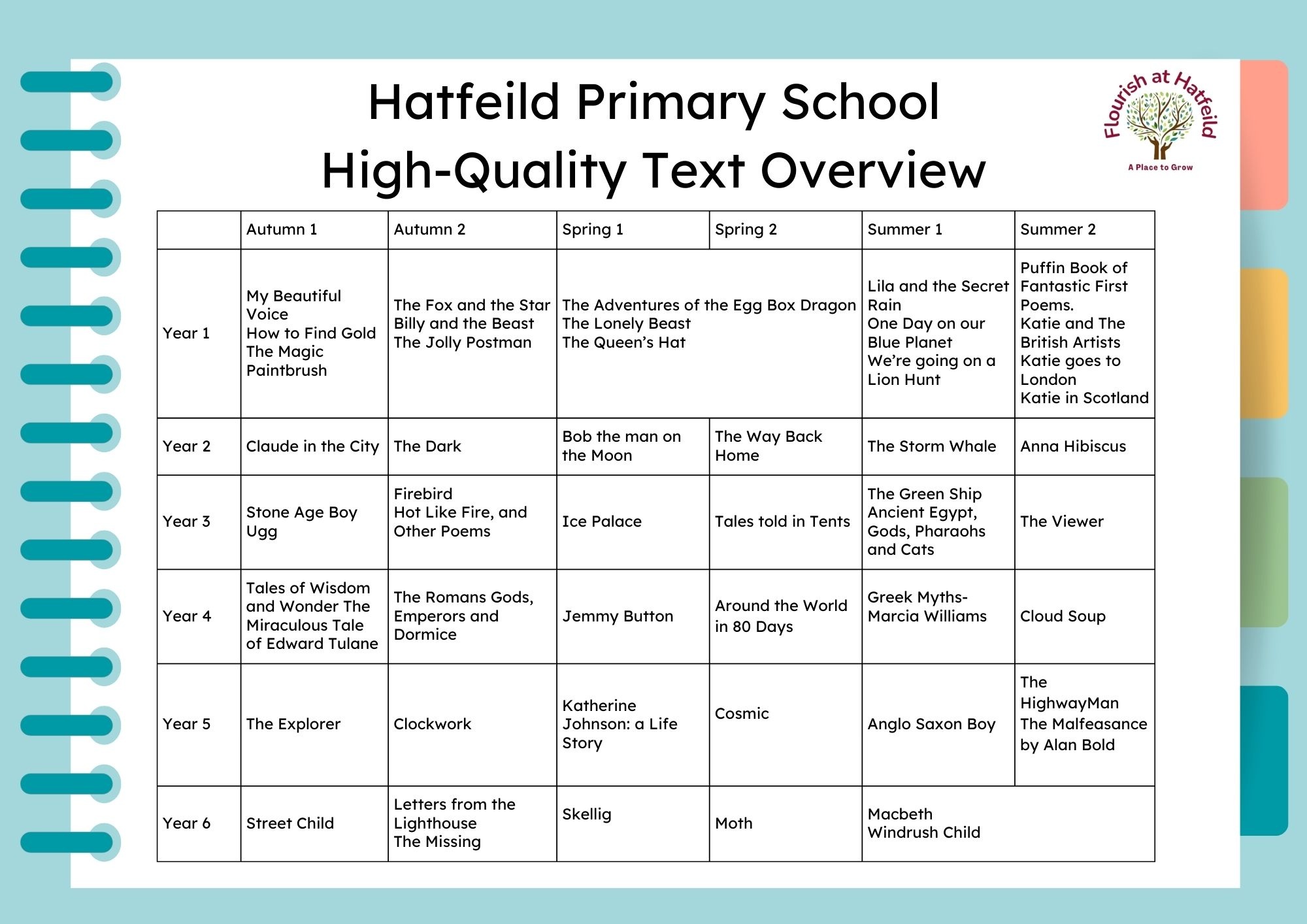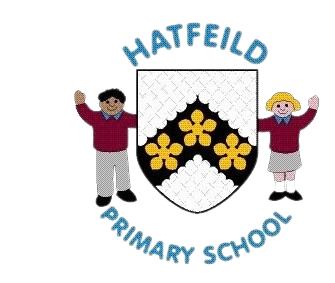English
Intent
At Hatfeild Primary School we believe that a quality English curriculum should develop children’s love of reading, writing and discussion. One of our priorities is helping children read and develop their all-important comprehension skills. We recognise the importance of nurturing a culture where children take pride in their writing, can write clearly and accurately and adapt their language and style for a range of contexts. We want to inspire children to be confident in the art of speaking and listening and who can use discussion to communicate and further their learning. We believe that children need to develop a secure knowledge-base in literacy which follows a clear pathway of progression as they advance through the primary curriculum. We know that a secure basis in literacy skills is crucial to a high quality education and will give our children the tools they need to be successful and participate fully in our society.
Alongside the 2014 National Curriculum, our intent is to enable children to:
- Read easily, fluently and with good understanding.
- Develop the habit of reading widely and often, for both pleasure and information.
- Appreciate our rich and varied literary heritage.
- Write clearly, accurately and coherently, adapting their language and style in and for a range of contexts, purposes and audiences.
- Develop a love of writing and to be able to express their thoughts and ideas clearly and creatively through the written word.
- Re-read, edit and improve their own writing.
- Confidently use the essential skills of grammar, punctuation and spelling.
- Acquire a wide vocabulary, an understanding of grammar and knowledge of linguistic conventions for reading, writing and spoken language.
- Use discussion in order to learn; they should be able to elaborate and clearly explain their understanding and ideas.
- Become competent in the arts of speaking and listening, making formal presentations, demonstrating to others and participating in debate.
Implementation
Teachers create a positive reading and writing culture at Hatfield, where both are promoted and enjoyed. English teaching and learning provides many purposeful opportunities for reading, writing and discussion. A wide variety of experiences and quality texts are used to motivate and inspire all children. All pupils receive a daily English lesson. Teachers use the ‘Jane Considine’ approach to writing, which offers well-structured English unit plans for teaching fiction texts, including those from ‘The Power of Reading,’ non-fiction texts and poetry.
Children in KS2 receive daily whole class reading sessions, where they are exposed to high quality and appropriate texts. New vocabulary is explored daily and children are exposed to a wide range of questions that link directly to the reading Assessment Framework. They use the Jane Considine Spelling scheme, delivering daily sessions. This enables pupils to acquire strategies to enable them to become independent learners in English, identifying spelling rules and patterns and how to tackle unfamiliar words when reading. Senior leaders have recently updated the KS2 reading books, investing in a new set of Badger Reading books to continue to encourage reading for pleasure across the whole school. Teachers understand the importance of reading aloud to children and this happens daily across the whole school. Children are exposed to a range of diverse authors and can vote for their favourite story to be read aloud during assembly. They have the opportunity to visit the school library each week and select a reading for pleasure book.
In addition, throughout the school year, the literacy curriculum is enhanced through World Book Day, author visits, parent 1:1 reading, drama workshops and a range of trips and visits which enrich and complement children’s learning.
At Hatfeild we believe that strong readers make strong writers. We follow the Power of Reading and Jane Considine.
Impact
Long term at Hatfeild, the impact and measure of this is to ensure children not only acquire the appropriate age-related knowledge linked to the English curriculum, but also skills which equip them to progress from their starting points, and within their everyday lives.
The impact on the children will be clear: progress, sustained learning and transferrable skills. With the implementation of the writing journey being well established and taught thoroughly in both key stages, children will become more confident writers and by the time they are in upper Key Stage 2, most genres of writing will be familiar to them and the teaching can focus on creativity, writer’s craft, sustained writing and manipulation of grammar and punctuation skills.
Successful implementation of the Read, Write Inc. Phonics Scheme, has meant that Hatfield Primary school has already seen a huge impact on the teaching and learning of phonics across the Early Years and KS1. The impact of this will become more evident in children’s writing and spelling at the end of KS1.
The new literacy initiatives outlined above will help to boost children’s learning and progress. As all aspects of English are an integral part of the curriculum, cross-curricular writing standards will also improve and skills taught in the English lesson will be transferred into other subjects; this will show consolidation of skills and a deeper understanding of how and when to use specific grammar and punctuation. As children move on from Hatfeild Primary School to further their education and learning, their creativity, passion for English and high aspirations will travel with them and continue to grow and develop as they do.
The Power of Reading
At Hatfeild we believe that every child is a reader and writer, and understand the importance of ‘The Reader in the Writer’, using this to underpin our vision for English. Links between children’s reading and their writing have long been recognised. We encourage children to understand the skills of an effective and influential professional author. Teachers can support and enhance children’s developing skills as a reader and writer in a meaningful and effective way.
The Power of Reading scheme is exciting to use due to the well-chosen texts which allow rich language and structured models for children to explore. Children are encouraged to see how a book influences its reader. Teachers create opportunities for reading and writing to inspire the children, whether that be from events, life experiences or text related.
The Power of Reading puts quality children’s literature at the heart of literacy learning and is built on years of research and best practice. The programme develops teacher subject knowledge and supports your school to raise engagement and attainment in language, vocabulary, reading and writing and meet all the requirements of the National Curriculum.
National Curriculum 2014
'All pupils must be encouraged to read widely across both fiction and non-fiction to develop their knowledge of themselves and the world in which they live, to establish an appreciation and love of reading, and to gain knowledge across the curriculum. Reading also feeds pupils’ imagination and opens up a treasure-house of wonder and joy for curious young minds.'

Jane Considine
At Hatfeild we have adopted 'The Write Stuff' by Jane Considine. This approach allows children to apply basic skills, vocabulary and grammar knowledge to write effective sentences, which are full of impact and keep the reader interested. As a school, all children from Year 2 to Year 6 are learning to write through 'The Write Stuff' approach.
In 'The Write Stuff' approach to writing, the children explore high level, rich vocabulary and are taught grammar in context through different writing lenses on the Writing Rainbow. There are three lenses used to support children with their writing:
- Fantastics – ideas for writing
- Grammaristics – tools for writing
- Boomtastics – writing techniques

As part of the teaching sequence, teachers plan experience days; sentence stacking lessons and independent writing sequences. Experience days immerse children in experiences linked to their writing and drench them in vocabulary linked to the lenses in ‘The Writing Rainbow’. From experience days, children take part in sentence stacking lessons. Sentence stacking lessons focus on writing three sentences with focus on lenses of the rainbow.
‘The Write Stuff’ follows a method called ‘Sentence Stacking’ which refers to the fact that sentences are stacked together and organised to engage children with short, intensive moments of learning that they can then immediately apply to their own writing.
An individual lesson is based on one plot point from the text, broken into three learning chunks:
1. Initiate section – a stimulus to capture the children’s imagination and set up a sentence.
2. Model section – the teacher models a sentence that outlines clear writing features and techniques.
3. Enable section – the children write their sentences, following the teacher’s model.
During the initiate section, children ‘chot’ (chat and jot) down their ideas from stimulating resources, such as pictures, music and drama. The children are encouraged to use ‘kind calling out’ where they call out examples of vocabulary, adverbs, onomatopoeia, pathetic fallacy etc.
During the Model section, the teacher prepares children for writing by modelling the ideas, grammar and techniques of writing taken from the writing rainbow.
In the Enable section, pupils write their own sentences, taking the opportunity to deepen the moment. ‘Deepen the Moment’ is where children are challenged to independently draw upon previously learnt skills and apply them to their writing during that chunk.
Following the sentence stacking, children are given the opportunity to show what they have learnt by planning and writing their own independent piece of writing. After they have written their independent piece, their work is marked by the class teacher who identifies different aspects of their written piece to be edited.

